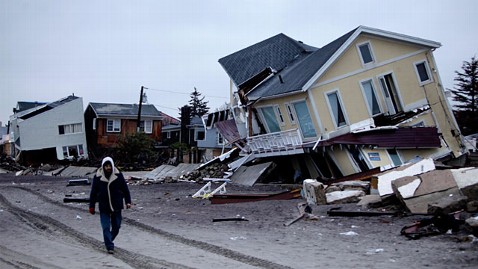
A man walks past destroyed homes on the Rockaway Peninsula in the Queens borough of New York, Nov. 27, 2012. A proposal in Congress would provide $60 billion in relief. (Seth Wenig/AP Photo)
The Obama administration’s $60-billion emergency aid package for victims of superstorm Sandy is now caught in the crossfire over the “fiscal cliff,” with some critics questioning why millions of dollars are directed to areas far from the epicenter of the storm.
The request, which still needs the approval of Congress, includes billions in urgently needed aide. But it also features some surprising items: $23 million for tree plantings to “help reduce flood effects, protect water sources, decrease soil erosion and improve wildlife habitat” in forested areas touched by Sandy; $2 million to repair roof damage at Smithsonian buildings in Washington that pre-dates the storm; $4 million to repair sand berms and dunes at the Kennedy Space Center in Florida; and $41 million for clean-up and repairs at eight military bases along the storm’s path, including Guantanamo Bay, Cuba.
The FBI is seeking $4 million to replace “vehicles, laboratory and office equipment and furniture,” while Customs and Border Protection wants $2.4 million to replace “destroyed or damaged vehicles, including mobile X-Ray machines.”
Related: Get the Latest on the “Fiscal Cliff”
The Small Business Administration is seeking a $50 million slice of the pie for its post-storm response efforts, including “Small Business Development Centers and Women’s Business Development Centers.”
The relief package also includes a whopping $13 billion request for “mitigation projects” to prepare for future storms.
But New York Sen. Chuck Schumer, a Democrat, said these mitigation efforts are an essential part of the rebuilding effort.
“Look, it doesn’t make sense to pay to fix subway stations, rebuild a dune or repair a home if we don’t protect it from the next storm,” said Schumer.
These line items, and dozens more like them, have some Republicans balking at the size of the relief request and calling for more time to review the deal. The $60 billion price tag, they say, represents nearly the entire amount of additional revenue the government would collect next year by raising rates on the top 2 percent of taxpayers, as Democrats desire.
They also point out that FEMA still has $5 billion in its Disaster Relief Fund — enough to last until March. Therefore, they see no reason to rush through a bill so large with no hearings or negotiations on the size of the bill or how to pay for it.
A White House official dismissed criticism of the size of the overall request and the specific amounts sought by federal agencies. The vast majority of the money would go to the affected region.
“The aid to federal agencies is a very small percentage of the entire package,” the official told ABC News. “On the federal items, we know what the damage is because we are the federal government. The storm damage has to be paid for at some point.”
“On other things — larger state-level infrastructure items, like hospitals — in many cases it still hasn’t been determined whether it’s cheaper to repair them or replace them,” the official said, noting that the less-specific “pots” of funds for states were intended to provide greater flexibility during allocation.
Governors of the states that bore the brunt of Sandy’s impact – New Jersey Gov. Chris Christie, New York Gov. Andrew Cuomo and Connecticut Gov. Dannel Malloy – had pressed the White House for an $80 billion package. But the administration decided a smaller amount was appropriate in light of deficit concerns.
“Private insurers must fulfill their commitment to the region; public assistance must be targeted for public benefit; resources must be directed to those in greatest need; and impacted States and localities must contribute, as appropriate, to the costs of rebuilding,” OMB director Jeff Zients wrote to Congress as part of the request.
In a joint op-ed in the Washington Post today, the governors pressed lawmakers “not to leave Washington” until they provide Sandy aid to the northeast.
ABC News’ Devin Dwyer contributed to this report.












